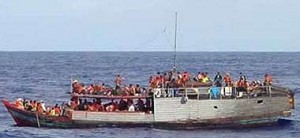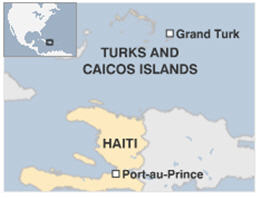 I join all citizens of the Turks and Caicos Islands (TCI) in expressing profound sadness over the loss of life that occurred after a boat carrying some 200 Haitian migrants ploughed into a coral reef in our waters on Sunday and capsized. Latest reports are that 67 remain missing, and are presumed dead.
I join all citizens of the Turks and Caicos Islands (TCI) in expressing profound sadness over the loss of life that occurred after a boat carrying some 200 Haitian migrants ploughed into a coral reef in our waters on Sunday and capsized. Latest reports are that 67 remain missing, and are presumed dead.
The boat was jam-packed with people. Men filled the deck, exposed to the hot sun, while women and men alike filled the dark, nearly airless hold below, survivors later told rescuers. Pierre said the hold was packed so tight that nobody could lie down.
The ones who knew how to swim, swam. The ones who didn’t, died.
(Associated Press reporting on its interview with survivor Joanel Pierre)
 But now that TCI and U.S. authorities have suspended their search for the missing, I feel obliged to note that my sympathy for those lost souls (and for those who survived only to be repatriated to their living hell) is tinged with outrage at the chronic conditions in Haiti that compel so many of its people to flee. Not to mention that such tragic events have become so commonplace in the Caribbean Sea that people throughout the region can be forgiven for bemoaning compassion fatigue.
But now that TCI and U.S. authorities have suspended their search for the missing, I feel obliged to note that my sympathy for those lost souls (and for those who survived only to be repatriated to their living hell) is tinged with outrage at the chronic conditions in Haiti that compel so many of its people to flee. Not to mention that such tragic events have become so commonplace in the Caribbean Sea that people throughout the region can be forgiven for bemoaning compassion fatigue.
In fact here, in part, is how I bemoaned this recurring tragedy in a commentary over four years ago:
Caribbean nations are becoming extremely exasperated with the seemingly endless influx of Haitian migrants into their countries. Because it is now painfully clear that these desperate souls not only drain limited social services but also contribute to increasing incidences of crime and disorder in local communities throughout the region…
Despite increasing political stability, chronic poverty, hunger and violence in Haiti continue to compel exodus en masse from its shores. And, with a population of almost 8 million potential migrants, Haiti looms as a persistent, menacing presence for every country in the Caribbean.
[The plague of Haitian migrants in the Caribbean, TIJ, March 31, 2005]
Harsh, I know, but true….
 Meanwhile, an even greater tragedy is the number of these jam-packed boats that have capsized in open waters, where no SOS was sounded for regional authorities (or the U.S. Coast Guard) to rescue even those who managed to swim – desperately and aimlessly – for hours … before drowning.
Meanwhile, an even greater tragedy is the number of these jam-packed boats that have capsized in open waters, where no SOS was sounded for regional authorities (or the U.S. Coast Guard) to rescue even those who managed to swim – desperately and aimlessly – for hours … before drowning.
Moreover, I fear that no sophisticated radar system, comprehensive border patrols or draconian immigration laws will quell the tide of Haitian migrants washing up on our shores.
No accident or death at sea will ever deter Haitians from fleeing the nightmare of their daily lives at home. Likewise, however, no Caribbean nation should be expected to cope with the chronic menace posed by these Haitian migrants. Indeed, just imagine the clear and present danger they pose – with millions of Haitians just lying in wait to flee – to the national sovereignty of a country like the TCI with a native population of only 22,000.
[The tragedy of being Haitian at home and at sea, Caribbean Net News, May 11, 2007]
That said, let me hasten to clarify that I do not blame Haitians for taking to the sea. Frankly, if I were living their lives of such oppressive desperation, I would do the same.
Unfortunately, every Caribbean country is now following U.S. practice by aggressively repatriating them. Therefore, improving living conditions in Haiti offers the only hope for a better life for the vast majority of these would-be immigrants.
And, the United States bears far greater responsibility to help improve those conditions than all Caribbean countries combined. This, not only because of its vast resources, but also because of its de facto colonial legacy in Haiti:
American presidents are almost as responsible for creating the nightmarish living conditions in Haiti as the succession of incompetent, corrupt and ruthless leaders they’ve sponsored throughout Haiti’s modern History…
The American government must honour its unfulfilled obligations to help build a Haiti than can sustain, govern and police itself.
[The plague of Haitian migrants in the Caribbean, TIJ, March 31, 2005]
In the meantime, I urge President Obama to reform U.S. immigration laws consistent with these obligations. He can begin by granting Haitians the same protected status Cuban migrants have always enjoyed. Except that he seems inclined to use the same politically expedient excuse – that such reform would trigger a mass exodus – that his predecessors used for almost 50 years to justify U.S. discrimination against Haitian migrants.
 In a similar vein, I urge Rear Admiral Steve Branham, commander of the Miami-based Seventh Coast Guard District that assisted the search-and-rescue operation, to “recalibrate” his admonition to Haitians to take “safe and legal ways to immigrate to the United States.” After all, the Admiral knows full well that the reason they take these “ill-advised [and] inherently dangerous” voyages is that Haitians know full well that they don’t stand a snowball’s chance in hell of immigrating to the United States (or any Caribbean country for that matter) by safe and legal means; i.e., via commercial airlines.
In a similar vein, I urge Rear Admiral Steve Branham, commander of the Miami-based Seventh Coast Guard District that assisted the search-and-rescue operation, to “recalibrate” his admonition to Haitians to take “safe and legal ways to immigrate to the United States.” After all, the Admiral knows full well that the reason they take these “ill-advised [and] inherently dangerous” voyages is that Haitians know full well that they don’t stand a snowball’s chance in hell of immigrating to the United States (or any Caribbean country for that matter) by safe and legal means; i.e., via commercial airlines.
 On a slightly more positive note, I commend UN Secretary-General Ban Ki-moon for appointing former President Bill Clinton as Haiti Envoy. Because, in addition to keeping this country’s despairing plight in our global consciousness, Clinton will be able to marshal more financial resources and technical expertise to build infrastructure, improve democratic institutions and establish regard for the rule of law (and human rights) than any Haitian, including President René Préval and Wyclef Jean, ever could.
On a slightly more positive note, I commend UN Secretary-General Ban Ki-moon for appointing former President Bill Clinton as Haiti Envoy. Because, in addition to keeping this country’s despairing plight in our global consciousness, Clinton will be able to marshal more financial resources and technical expertise to build infrastructure, improve democratic institutions and establish regard for the rule of law (and human rights) than any Haitian, including President René Préval and Wyclef Jean, ever could.
Mind you, this is the least Clinton can do considering that it was he who initiated the inherently unfair, if not racist “wet foot, dry foot” immigration policy during his presidency, which stipulates that seafaring Cuban refugees who make it to U.S. shores must be assimilated, unconditionally; whereas, seafaring Haitian refugees (fleeing even greater persecution and privations) who make it must be repatriated, summarily.
Nevertheless, no one is more responsible for Haiti’s living nightmare than Haitians themselves. Because even though white foreign faces have appeared as evil forces from time to time, black indigenous faces (like those of the Tonton Macoutes, FRAPH and even Aristide’s “Chimeres”) have been the constant, central and catalytic forces in Haiti’s purgatory.
Therefore, as we convey condolences to the families of those who were lost at sea, let us also pray that Haiti will finally be released from the curse (voodoo?) of factional strife that has undermined all efforts to implement policies for its sustainable development and economic security.
NOTE: If the U.S. really wanted to deter Haitian migrants, it would concentrate U.S. Coast Guard patrols between Haiti and Cuba to interdict them – just as it did so successfully during the early 1990s under an operation called Able Manner. But since the vast majority of these Haitians end up in the TCI or The Bahamas nowadays, the U.S. no longer has a national interest in committing resources to enforce that kind of aggressive interdiction.
Related commentaries:
The plague of Haitian migrants…
The tragedy of being Haitian
Calls to punish TCI police for Haitian boat tragedy
Montel says
This article speaks very honestly about Haiti’s plight and it’s affect on it’s neighbours.
David says
“Men filled the deck, exposed to the hot sun, while women and men alike filled the dark, nearly airless hold below, survivors later told rescuers. Pierre said the hold was packed so tight that nobody could lie down.”
This sounds like a description of one of the 18th century slave ships. What a bizarre irony that a nation of people descended from slaves who courageously cast off their oppressors would, 200 years later, ship themselves in the same conditions to work hard manual labor in countries still run by Western powers.